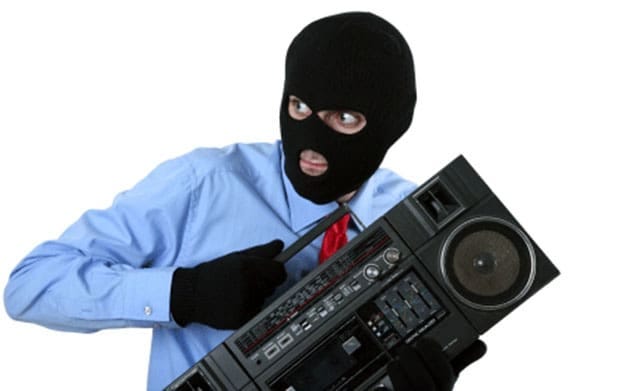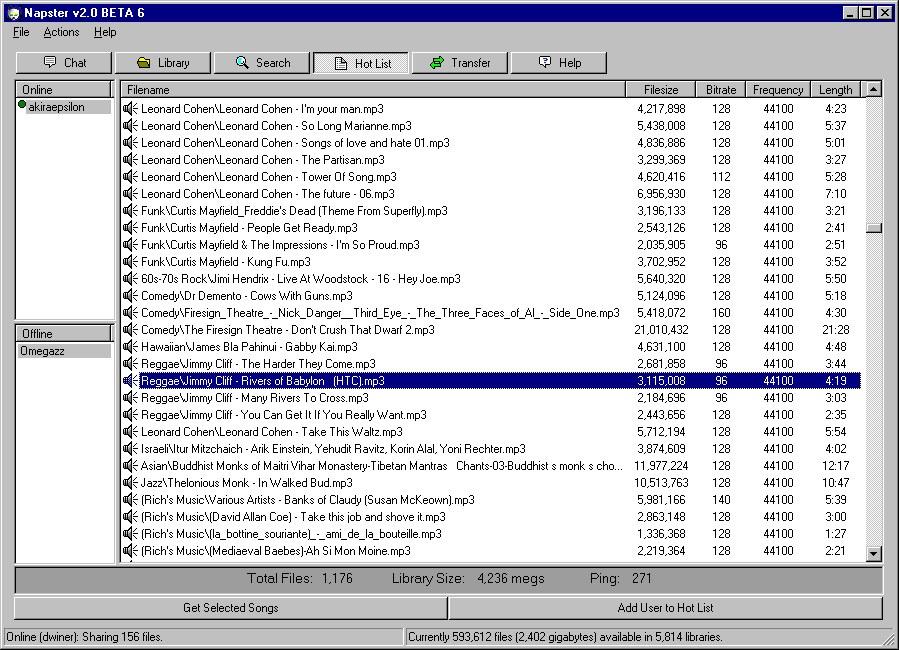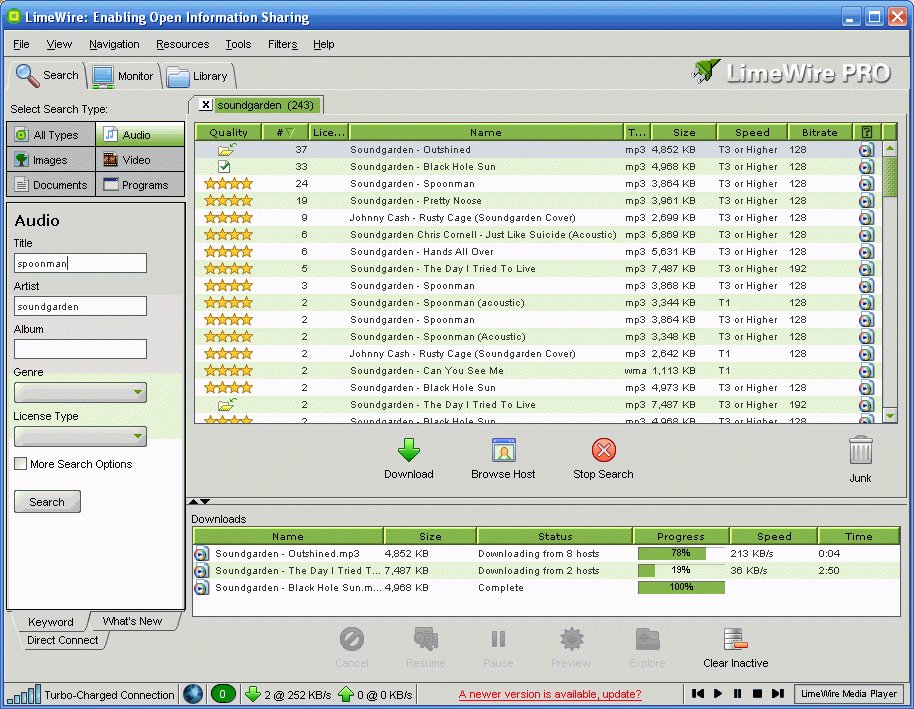All images courtesy of Getty Images

By Andrew Daly
andrew@vinylwriter.com

What does it mean to steal something? I suppose, in the most literal sense, it means to take something that isn’t yours. That being said, ask the same question when it comes to music, and the answer becomes much more complex. Yes, artists have indeed been stealing from one another since the beginning of time. Many would say they are merely borrowing ideas from peers, so where is the line? Let’s discuss.
I grew up in the 90s and just like the rest of my 90’s comrades, we all pirated music offline. Beginning with Napster and eventually moving on to Limewire, The Pirate Bay, and more, at one point I had thousands of songs I literally “stole” offline and downloaded onto my computer. Save for the occasional virus here and there, things were great. These days, I literally pay for all of my music. Be it digital or physical, I pay for it. I take pride in supporting the artists that I love and it also helps that I’m no longer a broke teenager anymore. I suppose the willingness to pay for one’s music could be seen as a harbinger of personal success.
Anyway, I remember the Napster craze very well. In the late 90s, my best friend Joe and I would slave away doing jobs for his mom on weekends, just so we could head down to Looney Tunes and buy one CD. Back then CDs were expensive and so, when Napster came along, the idea that we could get all the music we wanted for free seemed like a pretty great proposition at the time. As 12 year old’s, we had no concept of royalties, or that this was these artists’ careers. All we knew is that we were getting the music we wanted for nothing and we loved it. This went on for years even after Napster was shut down.
I remember seeing Lars Ulrich of Metallica on TV in a courtroom pleading his case for shutting Napster down. At the time, I kind of thought he was a jerk. Who was this guy to take my music away from me?! It’s funny how naïve kids can be. I guess in my mind, I felt like Lars was rich and that he certainly could afford to let little old me and my friend download his music for free. The thing is, I never took into account that this was an artist, who slaved away to create something. Furthermore, this was his job and he deserved to be paid for it, as well as share art that was his. Again, I was 12 and this concept was lost on me. These days, I understand that all artists deserve to be compensated for their work and that we have no right to steal from them. I would say that I regret all of my “file sharing,” but I was a product of the times, and I discovered troves of music I would not have ever known otherwise. Music that I have since paid for via Apple Music and on vinyl. I would say I’ve made amends.

So, these days I definitely feel as if all artists should be compensated for their work. That being said, I’ve learned over time that sometimes artists steal from other artists and end up cashing in on that theft. What do we make of that? Led Zeppelin most definitely lifted the basis for “Stairway to Heaven” from a band called Spirit. Listen to their instrumental song “Taurus” and it’s really undeniable, and yet the case was thrown out in court. Led Zeppelin is also known to have perpetually lifted music and riffs from classic Blues tracks for many of the songs throughout their first two albums, Led Zeppelin and Led Zeppelin II. Led Zeppelin cashed in big time on those records, and the artists they stole from have yet to be truly compensated. So, what do we make of that?
One of my favorite bands, Oasis, released a really catching track called “Shakermaker” and as much I love the band, it’s very obvious they lifted this track from The New Seekers and their track from the 70s, “I’d Like to Teach the World to Sing (In Perfect Harmony).” While Oasis was taken to court and subsequently forced to pay royalties on the song, it still serves as another example of theft in music. I could go on and on about the genres, artists, and years. The list of examples is endless. So, here lies the conundrum. Are we to feel bad for stealing music online from artists who so frequently steal from one another? Furthermore, if the genesis of most Pop music is Pachelbel’s “Canon in D” which was written in 1680, then is there really any truly original music out there at all?
I’ll throw one more wrench into this whole stealing music idea. In 2007, Radiohead released what may well be their best album, In Rainbows. For my money (no pun intended), it’s probably their best, or at the very least, my favorite. I remember the release well, and with good reason – the band released it for free. Well, sort of. Let me explain. On the heels of all this file-sharing, and stealing, for of the morality of it, Radiohead decided that they had simply had enough. And so, the band dropped In Rainbows on their site as a “pay what you want” deal. This basically meant, that if you wanted the album for free, the band was allowing it. If you wanted to pay one hundred dollars, you could do that as well. At the time, I didn’t really understand what I was looking at and so, I attempted to download the album without paying, and to my surprise, the files loaded directly onto my desktop and that was that. This was the first time that I ever truly felt bad about “stealing” music. So bad, that I did in fact go back and download the album again. This time, I paid twenty dollars.

Looking back, I don’t know how many people actually paid for that album or not, but I have a feeling that a great many people had the same experience I did. The band is trusting us to pay for the album. They aren’t forcing us to pay a preset price. They’re giving us the chance to pay what we feel the album is worth. These days, most artists on Bandcamp give you an option to pay more for an album if you think it’s worth it. They don’t allow you to pay nothing, but looking back, Radiohead’s gamble definitely was the genesis of the “value for value” system in terms of paying for music. For me, it wasn’t too long after this moment that I completely stopped “stealing” music altogether.
So, what are we to think about stealing music? Are the creators of Napster Robin Hood-like-anti-heroes, stealing from the rich and giving to the poor? Are they making the grave injustices of the Led Zeppelin’s and the Oasis’s of the world right? Or are they just assholes who don’t want to pay for their music? I myself pay for my music now. I simply don’t need to steal my music anymore and I do get satisfaction out of supporting the artists I love, even if they did lift the riff or the melody. I’m not here to tell you what’s right, or what’s wrong and I suspect this debate will rage on until the end of time. Music is a business and a big one at that. As is the case with any large business, everyone is forced to live in a sort of gray area. As consumers, I am not sure where that leaves us. Do we pay what we can afford, or do we take what we want? Igor Stravinsky once said, “Lesser artists borrow, but great artists steal.” So, I think the answer to this debate lies within all of us. As always, the choice is yours. Choose wisely.
/cdn.vox-cdn.com/uploads/chorus_image/image/63703125/musicpiracy2.0.1538151521.0.png)
– Andrew Daly (@vwmusicrocks) is the Editor-in-Chief for www.vwmusicrocks.com and may be reached at andrew@vinylwriter.com





Leave a Reply